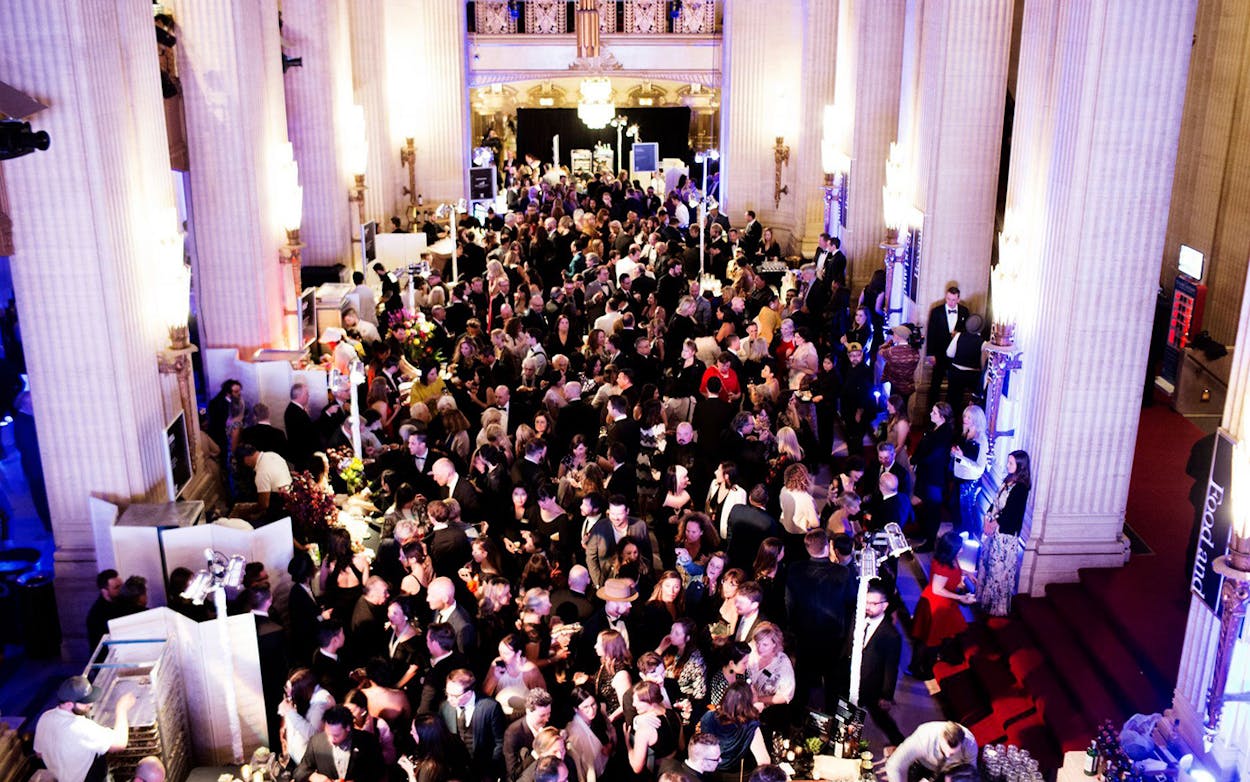Judging by the assorted yips and yelps and whistles, there were a lot of really, really happy people in the audience for the James Beard Awards in Chicago on Monday night. I was sitting halfway back in the auditorium, so I had a great view of the stage—which was illuminated by pulsing colored spotlights—and I watched the giant video screen as it tracked winners trotting down the aisle, smiling, laughing, giddy with happiness.
Sadly, though, none of the smiling and yips of joy came from the friends and fans of the four Texas nominees in the audience. Why? Because our guys did not win—take a breath—anything. Nothing. Zip. Nada.
I was flabbergasted. The year had started so strong for Texas, which earned a record 27 semifinalist nods in February. Although we ended up with only four finalists, they were all for Best Chef: Southwest, giving us what looked like a lock on that category. Instead, on Monday night, the Southwest title went to the one non-Texan on the list: Charleen Badman of FnB, in Scottsdale, Arizona. Kevin Fink of Emmer & Rye, Michael Fojtasek of Olamaie, Bryce Gilmore of Barley Swine (all in Austin), and Steve McHugh of Cured (San Antonio) were shut out.
What happened? My best guess is that in the final round, Texas actually had so many that we split the vote. Badman, on the other hand, apparently scooped up the non-Texas votes. (The Southwest region is big, including Arizona, Colorado, New Mexico, Oklahoma, and Utah in addition to Texas.)
And to those of you who point out—“I thought these awards were about food quality, period, not location”— that’s correct, of course. But tribalism will not be denied.
(The full list of winners is too long to include, but here are the top three: Ashley Christensen of Poole’s Diner, in Raleigh, North Carolina, won for Outstanding Chef; Zahav, in Philadelphia, claimed the award for Outstanding Restaurant; and Frenchette, in New York City, was named Best New Restaurant.)
But that aside, ignoring the disappointment of being shut out, I have to say that just being there was a serious rush this time around. I’ve been lucky enough to attend for the last six years as a member of the James Beard Restaurant and Chef Awards Committee, and this year was without a doubt the best awards ceremony I’ve ever seen: it had the most glamour, the most moving speeches, the funniest jokes, and—incredibly—the shortest run time: just over three hours.
In no small measure, the soaring 1929 Lyric Opera of Chicago building gets major credit for of the glamour quotient. Not only is the auditorium an art deco masterpiece, but the hallways and lobbies on every level had been turned into a labyrinth of booths from some of the nation’s best restaurants, wineries, distilleries, and more. (One of my favorite bites was the passion fruit–marinated white fish crudo with smoky pimento cream from the Breadfruit, in Phoenix.)
The emcee for the evening was Modern Family’s Jesse Tyler Ferguson, in rare form. It’s a little hard to explain, but at one point he ended up on stage in (mainly) his underwear, shoes, and tuxedo jacket as the punch line of a long-running joke about getting rid of things that do not “spark joy,” à la Tidying Up With Marie Kondo. (I thought it was pretty funny. Yes, I am twelve years old.)
And, as usual, the glamour and bling quotient among the attendees was high, including acres of sequins and gold lamé, a floor-length faux mink coat, a dapper seersucker tux, sweeping capes, many patent leather pumps, the occasional cowboy boot, and crippling stiletto heels. Fabulous!
And it was reasonably star-studded. (At one point Ferguson quipped that the Oscars are often referred to as “the Beard Awards for Hollywood movies.”) Famous chefs, like Daniel Boulud and Tom Colicchio, were too numerous to count. Presenters and attendees included Andrew Zimmern, Ayesha Curry, Peter Sagal, and part-time Austinite Zooey Deschanel (she gave out the Southwest award). In all the ceremonies were attended by more than 2,000 guests, who ponied up $500 general admission for the privilege.
But, seriously, folks, what stood out about the ceremony was not the window-dressing, as fun as that may be. The important, and most exciting, part of the evening was that this year marked the second year of major change in the whole complexion and tenor of the Beard Awards.
Until last year, the awards had tended to recognize restaurants in the upper echelons of the industry, restaurants with white tablecloths (literally and figuratively) and kitchens often run by white male chefs. But in 2018, as part of a confluence of many elements of social change in the country, the makeup of the award winners began to broaden: Eleven of the sixteen awards designated for individuals (as opposed to restaurants) were won by women and people of color. This year, the change continued, with ten of the sixteen going to diverse and female winners.
The impetus has many different sources. Part of it comes from the Beard Foundation’s new mission statement, “Good Food for Good,” expressing its goal to not only heap praise on the restaurant industry but also to help effect social change. That includes casting a broader net in its initial choice of contenders.
Another part is a reflection of the larger #MeToo movement and its push for female empowerment.
And a final part is a desire to have the award winners reflect a representative cross-section of America’s diversity. In his speech welcoming the audience, Chicago mayor Rahm Emanuel summed up the mood of the evening when he said, “[Tonight’s] nominees come from all parts of the world—diversity is what makes this a great country.”
- More About:
- Bryce Gilmore








